A few months ago OrthoChristian.com featured an interview on the St. Felix Orthodox Language Courses in Moscow, which offers several levels of language instruction, and an Orthodox Bible Study on the Gospel of John. The group has continued to grow and there arose the demand for a second Bible Study, and thus a study on the book of Genesis is now being offered.
This first introductory lecture attempts to lay some important groundwork before jumping into the actual text of Genesis—what kind of text is it? Why should we study Genesis? How can we study Genesis? How do the Fathers of the Church approach the text? To prepare for this lesson I returned to my class notes and thesis research from St. Tikhon's Seminary, including the copious notes given us by Bp. Michael Dahulich for his "Israel's Origins" class.
Below we offer both the audio and text of the Bible Study:
Скачать![]()
(MP3 файл. Продолжительность
It’s a little strange to start Genesis now, because we read Genesis in the services all throughout Great Lent. Lent is over and now we’re starting Genesis, but it's always good to study it because the whole of the Gospel can be found in the book of Genesis in a hidden form. It doesn’t say that Christ died on the Cross and rose again, but everything is there in prophecies and foreshadowings. The book of Genesis is important because it shows us how God intended man to be, it shows us why we’re in the condition we’re in now, and therefore it helps us to understand why we need Christ—what is it that we need to be saved from. The prophecies of Christ begin immediately after the Fall.
Of course God is angry at sin but He doesn’t turn His back on us. He doesn’t cast us aside. As soon as man fell God comes looking for him, and we see that God immediately begins saving us, bringing us back. It helps us to get a picture of the character of God. There’s a common idea among some people in Church history and some people today in other churches, and maybe some Orthodox people, that the God of the Old Testament is just angry and always punishing, and some people even think He’s evil. There were groups called the Gnostics that had elaborate theories with a whole set of gods, and the God of the Old Testament is actually evil, and Jesus is totally different, because He’s so nice. Essentially this heresy is Marcionism. In the early Church there was a heretic named Marcion who wanted to throw out the Old Testament because he couldn’t understand how the God of the Old Testament and the God of the New Testament fit together. So whenever we see this divide between the testaments we call it Marcionism. Yes, God punishes and we see the wrath of God against sin, but also immediately we see that God loves us, even when we fell. God gave us Paradise, He gave Adam and Eve communion with Himself, and they chose to throw it away. But He doesn’t throw us away. So we learn about God and ourselves. If you study Genesis and read the Fathers’ commentaries you can basically learn the entirety of the Orthodox faith.
Often you hear people say, especially about the first few chapters of Genesis, that the Church doesn’t have a set understanding—it just tells us that God created us, then we fell, and the Church doesn’t say much else. It’s not so important. But actually, besides the Gospels, Genesis is probably the book that the Church Fathers talked about the most; it seems to me—especially the first chapters. Every Father talks about Paradise and the Fall; it’s the starting point for our spiritual life—it’s the reason for Christ.
Of course there are many different ideas about the book of Genesis. What kind of book is it? What genre does it belong to? Is it poetic? Historical? Mythological? There’s a lot of controversy about these first few chapters that I’m sure you’re aware of, especially concerning Creation and evolution, which hinges on how to interpret the book of Genesis. What kind of book is it? Is it history, is it literal? Is it just figurative? When the Scriptures say God created Adam from the dust and Eve from his rib, is this literal? Did this really happen at some point in history, or do Adam and Eve simply represent all of mankind? Did they borrow from the mythology of the societies around them? Every one of these opinions can be found, even from people within the Church.
I had been a Protestant and I simply always believed that Genesis was literal. I was an Evangelical, and we didn’t believe in evolution or anything like that. But when I was becoming Orthodox I met people who told me that the Church has no hard stance and you don’t have to read it literally. I wanted to be Orthodox and truly think in an Orthodox manner, so I tried to be open to this idea and accept this. But thankfully I came across a book that my friend had—the biography of Fr. Seraphim Rose.[1] Fr. Seraphim himself did a lot of study on the topic of what the Church says about Genesis. He gave lectures and engaged in correspondences about it. In his own lifetime a book never came out, but after his death Fr. Damascene collected all his work into the book Genesis, Creation, and Early Man.[2] In his biography there is a chapter about all of this work, including several quotes from the Church Fathers, and I began to see that actually the Church does have a very precise interpretation of Genesis and actually the Church has said a lot. This is true in a lot of areas of theology nowadays. At least in America this topic is controversial, and about other topics such as what happens to the soul after death, people say, “Oh, the Church doesn’t really have a teaching,” but when you start to read you find out that actually the Church does.[3] God doesn’t leave us clueless.
Genesis as mythology?
One of the main ideas that you will hear about Genesis is that it’s just a Jewish mythology. You can read the Babylonian creation myths, like the book Enuma Elish and supposedly it’s exactly the same. But actually you see elements of these mythologies in Genesis, sometimes in the Psalms, in Isaiah, but it’s because as Moses was writing Genesis God inspired him to write it in such a way that our God, the true God, is shown as greater than these mythologies, that God is not like them. Sometimes in these mythologies you’ll have the idea of sea monsters, and the world being created out of conflict and chaos in the ocean and the gods are fighting with one another. In Genesis we don’t see this—God speaks and it’s created, and the Spirit is over the waters. God creates and there it is. There’s no conflict between gods. Especially the book Enuma Elish had a very political role. The Babylonians used it to justify the role of their empire. They had their god who won out over gods and therefore their empire is the best empire, and therefore there’s a specific way that society is ordered; but again, you don’t see this in the creation story in Genesis. It doesn’t even mention Israel. You can’t say it’s a political book for Israel. There’s nothing about the Temple, there’s nothing about the Law or the sacrifices. None of this is in the creation story. If you read just the creation story and knew nothing about the rest of the Bible you wouldn’t even know it’s a Jewish creation story. You can’t say it has the same role as the mythologies around them.
It’s also very important that these mythologies often gave a history of the gods, but Genesis is not like that. It just says, In the beginning God created—the presence of God is just assumed. It’s just accepted and doesn’t have to be proved. God did this—of course. He’s there and He created. And He’s shown as all-powerful—He speaks and it comes into being, so He doesn’t have to defeat other gods.
And how do the Scriptures begin? What’s the first sentence? In the beginning God created the heaven and the earth. So, in the beginning, God is already there. What does that tell us about God?
Student: He exists always.
Exactly. God has no beginning. When the beginning happens God is already there. He makes the beginning happen, which means He Himself has no beginning. We can’t understand that. He exists outside of time. He never started being. What does that mean? We can’t comprehend it but we just accept it as revelation. Also, there’s an important distinction showing that this is not just mythology—the Hebrew verb saying God created is bara. This verb is only used for God creating. If I took some clay and shaped it into a ball, that’s a different thing. I have formed or fashioned it. But this verb means specifically that God creates, and there was no material already existing that He used. The doctrine that God created out of nothing is called creating ex nihilo, which means out of nothing.
You can contrast this with when God created Adam—He took dirt that already existed and shaped it into Adam, but when God created in the beginning it’s totally different. There was nothing that He used. This is totally radical for the time of the Jews and the Scriptures, and when the Church Fathers come along and reiterated this. These mythologies always have them creating out of something else. In the Enuma Elish, water already existed before earth and man is created from the blood of one of the gods. The Greeks and these myths always have some other thing that exists, and many even believed in eternal matter. There’s God and there’s also this matter that also always existed. In our theology, if something has always existed it’s God. So basically they have made matter into God. But the Scriptures blow this idea out of the water, and the Church Fathers reiterated that, and it seemed totally ridiculous to the societies around them. It shows a completely different God—He’s all-powerful.
But Genesis itself does not say “ex nihilo.” The idea is there—In the beginning God created—and because it’s the beginning you can understand that nothing else was there, so He didn’t form it out of anything else, but it’s not explicitly stated. The first time this is explicitly stated is in the book of Second Maccabees, which is a later Old Testament book, sometimes called inter-Testamental. There was a group of seven Jewish brothers and the king ordered them to eat pork; but they’re Jews, it’s forbidden, and they refuse, so the king starts killing them. And their mother, Solomonia (we commemorate all of them—Solomonia and her seven sons on August 1/14) is watching them die and she’s encouraging them to stand strong in their faith. In 2 Macc. 7:28 she says to them: So I urge you, my child, to look at the sky and the earth. Consider everything you see there, and realize that God made it all from nothing, just as he made the human race. This is the first explicit statement of creation ex nihilo in Scripture. She says this to remind them that we have an all-powerful, omnipotent God; and she continues: Don't be afraid of this butcher. Give up your life willingly and prove yourself worthy of your brothers, so that by God's mercy I may receive you back with them at the resurrection (v. 29). We see here that all of these things are linked together—creation ex nihilo, mercy, and the resurrection.
Student: Was the resurrection already there in the Old Testament?
It’s there prophetically. The Pharisees believed in the resurrection but the Sadducees didn’t. There were different views, but you do see prophecies about it. This verse I just read is from the Old Testament. In the Book of Ezekiel we see the vision of the dry bones, God tells him to command the bones back to life, and he sees muscles and skin come back to the bone and sees the people rise up—and that’s an image of the Resurrection which we read on Holy Saturday. Of course it doesn’t explicitly say that God will become man and die and rise again and therefore at the end of time all of you will be resurrected, but there are hints and foreshadowings, and so the Jews were coming to an idea of it.
Some of these supposedly mythological ideas are there because it shows God triumphing over such gods. In Job you hear about the leviathan and sea monsters, but they’re used as symbols of evil. They’re not other gods. They took imagery from these myths and applied them to Satan, which shows how the Jews were thinking about these other mythologies. As an example, Isaiah 27:1 reads: In that day the Lord with his sore and great and strong sword shall punish leviathan the piercing serpent, even leviathan that crooked serpent; and he shall slay the dragon that is in the sea. These are all images of Satan.
Why study Genesis?
No matter how people interpret Genesis, some people say you don’t have to worry about it—just go to Church, say your prayers, and try to be a good person. So why should we study Genesis? Why are we bothering? I’ll read something to you from the book of Fr. Seraphim, Genesis, Creation and Early Man, which I believe is the best book available on this topic. Lots of people like to talk about Genesis and talk about creation and evolution but it soon becomes obvious that they are just giving their opinions, and they don’t really know what they’re talking about. But Fr. Seraphim did the work. He spent years studying this topic and reading the Church Fathers. He was actually the first to translate some of the Patristics in this book into English. He wanted to know what the Church says. And he didn’t just study, but he prayed. It says that through prayer Fr. Seraphim developed a personal relationship with St. Basil the Great, who wrote his own commentary on the six days of creation, which is highly esteemed in the Church.[4] Fr. Seraphim put in the effort to find the true teaching, and so I believe this is the best book you can read on this topic.
On the question of why to study the book of Genesis Fr. Seraphim says: “As we have said, there is a direct relation between how you behave and how you believe about man’s origin.” Where are we going? How should we act? He goes on to quote Fr. George Calciu, who was imprisoned in Romanian gulags and suffered for Orthodoxy for preaching the Orthodox faith to students who came to see him. In one of these talks he said: “You have been told that you descend from the apes, that you are a beast that must be trained.”[5] He’s saying there’s a very powerful idea that science proves that we’re just animals and therefore you can act like an animal. You should train yourself, but really you’re just an animal. In my experience, even if people don’t act this way completely, they really do believe this. I’ve met people who are not Christians specifically because they believe in evolution, because they believe they’re just animals and these two can’t be harmonized. I agree that they can’t be harmonized, but they’ve chosen the wrong side to unite with. They believe man is nothing more than an animal who somehow got lucky and is able to talk, but other than that we’re just animals. St. Barsanuphius of Optina said the same thing—that the English philosopher Charles Darwin created a system in which man is nothing more than a beast. He called it a bestial philosophy, and therefore people who believe it will treat each other like beasts—they will kill, they will torture, they will blow up churches.[6] I don’t know that St. Barsanuphius was making a specific prophecy, but look at the twentieth century. Nazism and Communism were very favorable towards evolution. Here in Russia it was an official state teaching. Some of the New Martyrs were martyred, at least in part, because they refused to teach evolution but rather preached from the Scriptures.[7] These systems killed innumerable people, so St. Barsanuphius was completely right, and Fr. George himself suffered. He knew what he was talking about.
Student: Evolution can be in some way true because even some theologians say that the ideas can be found in the Bible—that creation occurred stage after stage. So the idea is good, but not the message.
Well, the question is—can you really separate the message from the idea?
Student: You said that when people believe in evolution they think that humans are animals, but this idea should be separated from the theory.
Yes, there are many people who believe there are ways to put the Scripture and evolution together and there are various theories about how to do that. For example here in Russia you have Dcn. Andrei Kuraev. We’ll discuss this as we go on. I don’t think they can be harmonized and there is a very important reason. There are many reasons, but one very important and strong one especially, but we’ll get there.
So why study Genesis? Because it tells us who we are. Patriarch Alexey II said if you want to believe that you come from an ape, okay, go ahead and believe that, but don’t push it on other people. We should teach our children that they are the creation of God and that this will only increase their self-understanding—not to make them proud, but they’ll understand how they really are and how they should behave.[8] We’re not just beasts. We are specifically created by God and actually man is the summit of creation. Nothing created is greater than man. Between us and the animals is a huge chasm. Yes, we’re both physical, but man is also spiritual. That’s not a product of evolution. Man has a soul, so you can’t say that man as he is came about by evolution.
On interpreting Genesis
So we’ve talked about why we study it, and what kind of book is it. But Scripture always has many layers to it. We don’t have to ask, “Is Genesis literal or is it figurative?” Scripture is both. The problem comes when you want to choose one or the other. There are many theories out there, but for instance maybe there’s some Protestant Fundamentalists who only read Genesis literally. They say the six days are literal, God created out of the dust, and they don’t’ know how to penetrate to a deeper level because they don’t have Tradition. So when someone else says “No, Genesis is figurative or symbolic,” they get angry. I don’t have specific people in mind, this is just a hypothetical. But the opposite is a problem as well, when we say “No, Genesis is only symbolic and it’s not literal.” There are people like this both within and without the Church. A lot of people say “the Protestants believe Genesis is literal, so we can’t believe Genesis is literal. We’re not Protestants!” but this is just the opposite error. We don’t define ourselves by not being those other people. The Orthodox Church existed before the Protestant churches so we already have our beliefs. We don’t need to form them in reaction to somebody else. To put levels of meaning at odds with each other is not Orthodox, at least generally. Of course Christ told parables and we know they’re stories. We don’t have to believe there’s really a man who sent his servants and his sons to collect the harvest and they killed them. That’s clearly an allegory. But in general we don’t have to pit these levels of interpretation against one another. This is a problem with evolution. It has to reject the literal interpretation of Scripture. You have to say Adam is just a symbol of mankind, the days aren’t days, that there wasn’t ever a Paradise because death always existed in the world. At least all of the theories that I’m aware of have to reject the literal interpretation of Scripture, and the Fathers never did this. I’m not aware of a single Father anywhere in the Church who would reject the literal interpretation or the historical interpretation of Scripture.
This is true no matter where in the Church. There’s a common idea that has some truth to it, that the Fathers from Antioch were more literal and the Fathers from Alexandria preferred allegory and to read symbolically. Sometimes these two schools are pitted against each other, but no matter which Fathers you read—from Antioch, or Alexandria, or even from the Western Church, they all emphasize that the Scriptures are indeed historical.
St. Cyril of Alexandria, from the Alexandrian school where they love allegory, says: “Those who reject the historical meaning in the God-inspired Scriptures as something obsolete are avoiding the ability to apprehend rightly, according to the proper manner, the things written in them.”[9] If you reject the historical meaning of the Scriptures, you are rejecting the proper interpretation. By doing so you give up the ability to know properly what the Scriptures mean. There’s one from the Alexandrian school. In a book on Genesis, St. Augustine in the West says that he who can interpret it wholly literally is the most admirable interpreter of Genesis. If you can do it all literally, you’re wonderful![10] Several other Fathers specifically said it is dangerous to reject history. This is God speaking to you. He’s giving you this history. They went so far as to say it’s dangerous to not talk about the history and to reject it.[11]
Of course we see many layers in Scripture. It’s not only literal. There’s much more to it. Fr. Seraphim gives a very good example of this. When he is giving general principles for understanding Genesis and speaks about not placing different levels of interpretation against each other, he quotes from St. Macarius the Great talking about when Adam and Eve sinned and God kicked them out of the Garden and placed there an angel with a flaming sword. This seems like something that could be maybe hard to believe. Was there really an angel standing there with a flaming sword? Certain passages are more “normal”—Adam and Eve walked in the Garden and ate some fruit. That’s normal enough, but now there’s an angel with a flaming sword! That could easily be interpreted not historically. You could say it has to mean something else. St. Macarius says it means that in the heart of every person we have lost Paradise. In our heart we are blocked from Paradise until baptism. But, he says, that doesn’t mean it didn’t historically happen as well. There really was an angel standing there and he was holding a sword.[12] There really was a Paradise first of all. There really was a gate.
Even though the saints can see these deeper meanings and open them up to us, they never say, “Therefore the common level is not necessary.” St. Anastasius of Sinai, also from this allegorical Alexandrian school, wrote his own hexaemeron, or commentary on the six days of creation, and it’s highly symbolic and allegorical. Sometimes I had trouble following him. But, every few pages he would stop and say “Now remember, by giving you all these symbols, I’m not rejecting the historical meaning.”[13] No matter how deep the Fathers plumb the Scriptures they never discarded the surface level. Adam is a symbol of all of mankind, but in order for him to actually be a symbol of all of mankind, he has to actually exist. There has to be something that the symbol is grounded in.[14] Why is Adam the symbol of all mankind? Because he’s the first man. The symbol is grounded; it’s not just made up. They didn’t just decide to invent a character named Adam and say, “He means this, and he means that.” No, God actually works in history in such a way that history itself has meaning. This is God actually acting in history. He’s not just telling us nice stories.
The Fathers and science
A good thing to keep in mind about reading the Scriptures and the Fathers on Genesis, who lived 1500, 1600 years ago, is that we know more about science than they did, so we don’t have to accept every single word that the Fathers said. Sometimes they used examples from the science of their day to explain something in Scripture, but we understand that those are simply examples meant to illumine the people. The images that they’re using are not the dogma that they’re teaching. For example, St. Clement of Rome in the first century was trying to explain the Resurrection to people and he called to mind the phoenix—this fiery bird that habitually dies and rises from the ashes—as an example of resurrection.[15] It doesn’t matter that the phoenix is not real, because he’s not teaching us the phoenix. He’s just using a well-known image to teach the Resurrection. It’s important that these finer points of science are not what the Fathers are trying to teach but it’s what they’re using to help the people understand. Christ Himself uses the example of a mustard seed and says it’s the smallest seed in the world. But nowadays we know there is a seed that’s smaller than the mustard seed, but it doesn’t matter, because the people of that time didn’t know about that seed. It would have been meaningless, so Christ used what they knew. It doesn’t matter that it wasn’t completely factually true because it accomplished His task.
St. Anastasius of Sinai and St. Basil and St. Augustine all state that the revolutions of the planets, the weight of the planets, and all these things that astronomers, for example, love to get into are not the teachings of the Church. The Church does not care about these things.[16] They can be used as a tool but it’s not what the Church teaches. This is an important point because people love to say that the Fathers were just interpreting Scripture according to the science of their day, and because we know that the science of their day was not correct, we don’t have to listen to the Fathers when they talk about cosmology and when they talk about creation. They were primitive and going off of a primitive science. But the Fathers themselves are saying, “No, we’re not talking about science here. We’re giving you what the Church teaches. We’re giving you theology. It’s not science. We’re just using the science as a tool to help explain it to you.” It’s the same with philosophy. The saints are not philosophers; they just use it as a tool. They used certain terms and ideas from philosophy, because that’s what people knew, but they made them Christian. We could say they baptized these elements. The Fathers were some of the most educated people of their time. They knew science, but because their science was more primitive doesn’t mean we can disregard them.
Fr. Zacharias from Essex—the monastery that Fr. Sophrony founded—talks about science. He says that a lot of scientific progress was made by medieval western monks. A lot of the progress that was made was a result of the despondency of monks. He says the work of a monk is not to be doing science. It’s not bad to do science, but it’s not the work of a monk. His work is to pray and repent and attract the grace of God to share it with others. The reason they were able to progress so much in science is because they weren’t doing the real work of a monk.[17] This is not to say that science is bad, but it’s interesting that so much progress was made by religious people doing science instead of theology.
So when the Fathers are teaching about Genesis they’re not teaching from the science of their day. And actually the science of their day contradicts what they say. As we said, a lot of the Greeks believed that matter was eternal but the Fathers don’t say that. They say there’s a specific point at which God created, and time is linear. The Greeks believed in a cycle of time. Things would always come back around on themselves. We’ll see that what the Fathers were teaching is not what the philosophers were teaching. St. Basil wrote his Hexaemeron, and he’s the most respected interpreter of creation in the Church, and in it he talks about what others teach, but he says, “Let’s forget all that, and come back to the teaching of the Church.” He’s emphasizing that this isn’t his opinion. This isn’t from secular society. This is what the Church says. As a saint he’s not going to make stuff up. Especially as a bishop his job is to teach the faith; and that’s what he did.
You can see this in the book of Exodus. The Pentateuch, the first five books of the Bible written by Moses, was given to him on Mt. Sinai when he spoke to God. And it says that God spoke to Moses in a certain way—face-to-face as a man speaks to a friend. As I’m speaking to you, God spoke to Moses. He spoke to Moses plainly, not in dark riddles.[18] Based on these verses, the Fathers say, “Then, when it says a garden was planted, it means a garden was planted. And when it says four rivers, it means there were four rivers.” In the early Church, especially with the Gnostics and some other groups, people were always looking for deeper spiritual meanings to everything, but only spiritual meanings, which as we have said is a problem. But the Fathers said that God spoke to Moses face-to-face, so understand the words as they are written, as St. Basil says.[19] When it says the animals were brought to Adam so he could name them, it means the animals were brought to Adam so he could name them, and just accept it. St. John Chrysostom says if anyone tries to tell you some other interpretation, some other lofty grand allegorical interpretation, plug up your ears and don’t listen to them.[20] Basically they’re trying to make themselves wiser than Scripture as St. Basil says.[21] Just stop listening to them.
Origen was a great teacher in the early Church, but when it comes to creation he had a lot of whacky ideas. He brought in too much paganism. He believed that man being created with physical bodies is a result of pre-eternal souls ceasing to contemplate God and so they fell into a material existence. We don’t believe that of course. Origen had many good things to say, but on Genesis he had a lot of weird things to say. St. John of Damascus talks about the same thing as St. Basil and St. John Chrysostom, and says don’t get too crazy with these allegorical theories as did Origen with his mad “ravings.”[22] Origen was actually anathematized by the Church, which is beyond excommunication, meaning you are out of the Church for good. Origen was anathematized because his ideas on creation were too crazy. Allegory and symbolism are good, but keep it within the bounds of the Church.
Scientific theories can go into great detail, whereas the Scriptural accounts of creation don’t seem to have that much detail. God spoke and there was Adam and not much more detail is given. Therefore people say you can’t take this literally because God spoke to them in simple, primitive terms they could understand. One of the common things you always hear is that God said that He created in six days because the Jews could not have understood longer periods of time. They had a cycle of six days and a day of rest and that’s what they understood, so if God had spoken about billions of years they simply would not have comprehended. But this idea that ancient people couldn’t understand anything just seems ridiculous. In the book The City of God by St. Augustine he talks about how the early Christians didn’t just believe anything you told them. They would actually research and verify it. These were people nearly 2000 years ago. Just because they lived before us doesn’t mean they were stupid and gullible, or they’re all just superstitious and they’ll believe anything. They wanted to know truth, and I think we can say the same thing about the Jews of the Old Testament. And also, you can read the verse Gen. 24:60: And they blessed Rebekah, and said unto her, Thou art our sister, be thou the mother of thousands of millions, and let thy seed possess the gate of those which hate them. “From you will come thousands of millions of people.” Obviously the Jews can understand big numbers. They’re not stupid, as if big numbers confuse them, so God had to pretend He did it all in six days.
Theology and Science
There’s also the idea of non-overlapping magisteria, which means you have theology here, and you have science there, and they don’t communicate with each other. It doesn’t matter what you believe about science, it doesn’t have to affect your theology, and vice versa. Just keep them separate. A lot of people believe this. I was very disappointed to find a video on YouTube where even Met. Kallistos Ware espouses this view.[23] He doesn’t specifically say “non-overlapping magisteria,” but he basically gives the idea. In our Scriptures we talk about the creation of the earth, the creation of man, what man’s nature is like—he was created, he fell, there was a change—what is his body like, what is the purpose of his body? Obviously all of these overlap with science. We believe that God Himself entered physical creation and took on a body. That obviously has implications for the physical world. Man himself in his soul, and also in his body, is meant to contain grace. The purpose of man’s body is to possess grace, so scientists cannot fully comprehend even the body of man, because they don’t understand grace. Of course they can if they’re also faithful Orthodox.
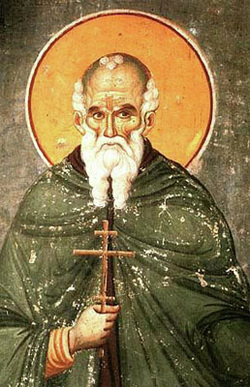 St. Maximus the Confessor, reknowned for his theological cosmology
St. Maximus the Confessor, reknowned for his theological cosmology
Genesis says that God brought all the animals before Adam and he named them. He didn’t just pick nice names that he liked. He understood these logoi-ideas in the mind of God because he had not sinned yet, because he was full of grace, because he was still living according to what God intended for him. He could look at them and have some understanding of the idea that God had of them, and he named them according to that.
So the idea that science and theology don’t overlap is ridiculous. Death is biological, but also the Church obviously teaches us why things die, so clearly these things overlap.
Student: Maybe I missed this topic, but do you agree that the creation of the world was in a literal week? Some priests believe that these days were not twenty-four hours, but maybe a million years or something like that.
We did talk a little bit about that, but we’ll talk more about it when we come to the verses about the evenings and the mornings making up a day, but the principle that the Fathers use here is that God spoke plainly to Moses. So when He said “days,” He meant days. The only Father that I’m aware of who said that they were not literal days is St. Augustine, and he actually thought the whole creation week was just one instantaneous moment.[25] So that’s also not compatible with evolution.
Student: These priests want to reconcile science and theology and that the world is billions of years old, and there are other priests that don’t believe that he world is so old. But maybe there were stages.
There are lots of people who say that the days are symbolic of stages. We’ll talk about that. The desire to harmonize science and theology is a good desire. Of course science is not bad—it just depends on how you use it. If something in theology is true, then it has to harmonize with something in science that is true. Truth can’t contradict truth. All truth is a reflection of Christ. If something in theology and science do contradict then either theology is wrong, or science is wrong, or they’re both wrong, and we have to figure out which. And the question is which do you trust more? If the Fathers say a day means this, and every scientists says a day means that, who are you going to trust? I guess it’s a personal decision, but really it’s not. If you’re Orthodox you don’t really have a choice. Being Orthodox means accepting what the Church says. The question is discerning if the Church really says something about it. As we said, a lot of people think the Church doesn’t say much about Genesis, but it actually says a lot.
How to "investigate" Creation
Here is an important question, that to study Genesis you have to understand: how can we know about the creation of the world and the time when Adam was first created and about their lives in the Garden before the Fall? Obviously we’re not living in Paradise and it’s something we’ve never experienced. So how can we know about it?
Student: Spiritual people can achieve a state when they can see God’s will and that’s why they can know about it.
Exactly. You’re completely right. When God spoke to Moses, He didn’t just speak to Moses. God actually showed him in a prophetic vision. St. John Chrysostom says that Moses is unique in the Scriptures in that all of the prophets speak of what’s to come, or with a message of repentance. In the book of Revelation St. John is seeing the future. But only Moses sees the past. He’s a prophet of the past.[26] I saw one icon from an old Bible manuscript with Moses sitting in the Garden of Eden writing the book of Genesis. I’m not necessarily saying Moses was actually transported to the Garden and wrote there, but he actually saw it and was there in spiritual experience. This is a completely different thing than philosophy or scientific research looking at the surface of things and trying to understand. This is just God saying, “Here’s what I did.” Several Fathers specifically say that Moses actually saw it. And how do they know that Moses saw it?
Student: After the forty days of talking to God Moses was surrounded by light.
Well, you could say he had the light because he was in the presence of God, but nowhere in the Scripture, as far as I’m aware, does Moses say God showed him the creation of the world. But the Fathers say Moses saw it. How do they know he saw it?
Student: I agree with what she said earlier. They achieved a stage of spiritual communication with God and so they understand much more and so they somehow knew.
You’re right that it’s because they attained a certain spiritual stage, but we can say even further, that they knew that Moses saw creation because they also saw creation. It wasn’t just that they became holy and God told them that He showed creation to Moses. It’s that He showed them too, and they saw the same thing that Moses had written. St. Isaac the Syrian in the seventh century has a book The Ascetical Homilies which basically every monastic loves, such as St. Paisios of the Holy Mountain. In it he talks about those who have attained spiritual heights, and he says “And from this one is already exalted in his mind to that which preceded the (making) of the world, where there was no creature, no heaven, no earth, no angels, nothing of that which was brought into being, and to how God, solely by His good will, suddenly brought everything from non-being into being, and everything stood before Him in perfection.”[27] So he’s saying that holy people reach a point where God shows them creation. St. Anastasius of Sinai also says it.[28] St. Gregory of Sinai talks about the eight visions of ascetics and one of them is the composition of visible things.[29] The former abbot of Vatopaidi on Mt. Athos reposed in 2009—seven years ago, and I’ve heard from various people that have been to Vatopaidi that this Elder Joseph also saw creation, so this is something that’s still happening. And they say he saw it precisely as Moses had written it.[30] There was no difference. This is why the saints know that Moses had a vision—they had the same vision and it was corroborated.
The reason that this is the way we know about Genesis is because of the Fall. The Fall is a barrier that stops science and philosophy. They can go back that far, but they can’t go to the other side. The Church teaches us that the world was a paradise—there was no death, no corruption, no sin, and no pain. This is a totally different experience than we can understand, and we can’t investigate this with our own minds. It has to come from revelation. Fr. John Romanides says this: philosophers and scientists confuse themselves. They think that the Fall of the world is actually the creation of the world, because that’s as far back as they can go. They don’t know it’s the Fall because they don’t have Tradition, so they think it’s the beginning.[31] So to talk about the acts of God and especially the creation of the world we have to look to Divine revelation.
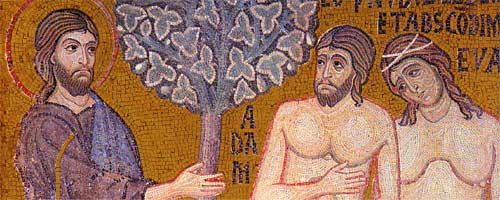
Countless Church Fathers say this. St. Barsanuphius of Optina was standing on a balcony with some disciples and he points to the moon and says look how glorious the moon is, this wonderful creation of God. But even the glory that it has now is nothing compared to the glory it had before the Fall. Even something like the moon is totally different now. We don’t know what it was like.[32] Only God can show us. This is a fundamental point—when we want to know about creation and the time before the Fall we have to go to revelation. As I can understand it, any scientific theory that tries to tell you about the time before man is denying this whole idea. It’s assuming that the world has always been as it is now. To date a rock you do so by measuring the corruption of elements within that rock. But there was no corruption. These things didn’t happen before the Fall. So in order to do this and talk about the time before the Fall you’re already saying there is no such thing as the Fall. There’s no other way to even begin to pretend to study this time, scientifically or philosophically. Earlier we talked about when the two seemingly contradict which do you trust? The Church teaches us that you have to listen to the saints—there is no other option.[33] Science can’t do it.
Genesis Chapter 1
Let’s now begin reading some Genesis. Genesis 1:1: In the beginning God created the heaven and the earth.
We’ve already talked about a good bit of this, but there’s a lot just in this one verse. We hear this verse all the time so it probably seems commonplace to us. But when St. Basil was preaching to his people about these first chapters of Genesis he says this, and I think this is a good attitude for us to have: “What ear is worthy to hear such a tale? How earnestly the soul should prepare itself to receive such high lessons! How pure it should be from carnal affections, how unclouded by worldly disquietudes, how active and ardent in its researches, how eager to find in its surroundings an idea of God which may be worthy of Him!”[34] For someone like a great saint like St. Basil this verse was mind-blowing. He stood in awe before God just from this one verse. He says the soul must be pure from carnal affections, or at least we should be trying for that. This is another reason why we have to read the saints—because they were pure from carnal affections. To see spiritual realities you have to remove yourself from sinful, worldly realities. The Scriptures were written under the inspiration of God and for us to understand them we also have to be under the inspiration of God. We have to try to be on the same level as the saints to have the same understanding as them. And if we’re not on the same level of the saints we should at least trust them. St. Gregory Palamas talks about three kinds of theologians. There are the saints who spoke to God face-to-face like Moses. That’s the height of theology—seeing God and understanding. The second level is someone who hasn’t seen God but trusts those who have. I haven’t seen God, but I trust St. Basil because he has seen God. And the third level is those who have had no vision for themselves and they don’t trust those who have had such visions.[35]
Student: They are not theologians.
Exactly! They are theologians in the sense that they write about theology, but they’re not theologians. We have such people in the Church. I’m not saying they are bad people or they’re trying to go against the saints, but nevertheless some people are.
Student: So they don’t believe what the saints say?
A lot of people like to dismiss what the Fathers said about Genesis because they weren’t scientists and they lived two thousand years ago so their science was primitive. So they’re dismissing the idea that he saints were speaking spiritually; they’re dismissing the idea that they were writing what God showed them. I don’t think they’re malicious people; they just, for whatever reason, don’t have this idea.
We talked about before what kind of text Genesis is and people often say it’s not a science textbook, so I don’t have to read it as science! And yes, it’s not a science textbook. As I said before the Fathers said the Church didn’t care about these kinds of things. But it’s funny to me—the people who often say Genesis is not a science textbook then interpret Genesis according to what the scientists tell them. If it’s not as science textbook why are you asking scientists what it means? It doesn’t make sense! It’s completely contradictory. When people say that I say, “Yes, therefore let the saints tell you what it means.” Of course it has science in it, but that’s not the purpose. So we all agree it’s not a science book—so therefore don’t ask a scientists what it means!
Time and eternity
In the beginning: We talked about this a little, but this means the beginning of time itself. It begins then and there. Time itself is not eternal but rather is created by God. The philosophers of their day and some Christians today can’t hold this. It’s impossible to comprehend that God is time-less. We don’t like things that we can’t comprehend so we try to change them so that we can comprehend them. It doesn’t even mean unending time. It’s completely different from that. We just have to accept it. What does it mean to be outside of time? Who knows? Time itself has a beginning and God is already there, so He’s before all time, and is the Master of time. He’s totally different than the pagan and mythological gods, and He’s not just a local god. He is the God of everything. He created the heaven and the earth, not just part of it, and He used no pre-existing matter, because this is the beginning. So people ask then, “What was happening before this?” Of course God always existed, but even to say He exists is not totally right—we “exist” and God just is. People ask, “What was He doing?” but even asking what He was doing implies a succession of time.
Student: Time exists only with material. When there is life there is beginning and end. When there is no beginning and no end there is no time. Time and death are attributes of the material world after the Fall. This is how I see it.
I think your basic idea of time is right. People like St. Dionysius the Areopagite and St. Maximus the Confessor, some of the deepest theologians we have, say that time is the measurement of sensible visible creation.[36] Time is the measurement of change. Everything came into existence via a change. There was nothing and now there’s something—that’s already a change. But God is changeless. Christ is the same yesterday, today, and forever; and in Him is no shadow of turning.[37]
Student: So eternity is not about time—there is no beginning and no ending. It’s different.
The term “eternity” is something to talk about as well, as it can have different meanings. We can say that God exists in eternity, or I think a better term is that God is pre-eternal, or that He is everlasting. “Eternity” can sometimes mean the timelessness of God, or it can mean the “time” that the angels live in, which is not God’s time and is not our time. Obviously God created the angelic world as well. If you apply the term “eternity” to the angels, then we also have to say that eternity is something created, and so God is pre-eternal. I’ll use “eternity” as the angel’s time, so angels are eternal, and God is pre-eternal, so as not to be confused. But understand that in this sense eternity is also created.
We see that God created the heaven and the earth, and here the heaven basically means the sky, the atmosphere. It’s not heaven as in “Our Father Who art in Heaven.” The creation account says nothing about the creation of the angels, so the question is when? St. John says there are different ideas about this. He notes that St. Gregory the Theologian says that even before this day one the angels were already created. So the beginning is the beginning of our time but the angels are already existing. But St. John says that others say the angels were created at some point during the six days. It doesn’t really matter, but he says all saints agree that the angels were created before man. Obviously on the day that man is created the serpent is there in the Garden, who is a fallen angel. So at some point before man the angels were created.
St. Maximus talks about how time keeps going on in succession but for the angels there isn’t succession, but there’s some sense of time—they made their choice to follow God or not, but for some reason after that their will is set. It’s hard to comprehend, but St. Maximus says: “for eternity is time when it stops moving, and time is eternity when it is measured as it is borne by movement, so that I arrive at the all-embracing definition of eternity as being time deprived of movement, and time as eternity measured by movement.”[38] It’s clear that eternity itself is a creation and is somehow different from our time. The angels exist differently. They had the ability to change but now they can’t anymore—that is, they can’t repent. Change for them is done. I guess they can grow closer to or farther from God but they can’t change direction. The fallen angels can’t repent and the angels can’t sin now, whereas we always have this opportunity. Man falls and gets up, falls and gets up, falls and gets up. The angels fell once and that’s it. There’s some kind of difference.
There’s a lot here that just this first verse leads us to talk about. St. John says that he agrees with the idea of St. Gregory of the Theologian that the angels were created before everything else.
There are many commentaries of the Fathers that you should read. I just read this verse, and I move onto the next verse, but the Fathers find so much meaning. You should read St. Basil’s Hexaemeron which means commentary on the six days, St. Ambrose of Milan’s Hexaemeron, and St. Ephraim the Syrian, St. John Chrysostom, St. Augustine, the Venerable Bede, and many others, all have commentaries on creation that are very useful.
So, in the beginning God created the heaven and the earth. He speaks and it’s done. The Fathers say here God creates instantaneously.[39] This reveals to them the omnipotence of God. There is no delay. And it’s interesting that some of the Fathers seem to even be arguing against a primitive idea of evolution. St. Ambrose of Milan says that this creation of earth didn’t come about through a slow concourse of atoms.[40] Stuff swirling around didn’t slowly come together over billions of years. God said it and it happened and that was it. So the idea that creation happened slowly already existed and the saints rejected it. St. Gregory of Nyssa said the idea that God created slowly is denying His power.[41] Why do you think He created slowly? He’s God! Stuff doesn’t respond to His word? He said it and it happens. This is important. It’s not just this first day. God speaks on six days, and each one is instantaneous. God says “Let there be plants,” and the Fathers says He didn’t create a seed that eventually became a tree, but rather, He created a tree. “Let there be trees,” and there’s a tree. So that tree is one second old but has the appearance of what we would call a mature tree. Everything happened instantaneously already in maturity. Adam and Eve were walking, talking, adults. He didn’t’ create fetuses. Everything God creates is instantaneous and mature and He can call it good. He’s not waiting for it to become good, to fulfill His purpose.
On the days of creation
Student: It’s not about time as we know it, I think.
This has brought up several times, so we’ll jump ahead a few verses. Verse 5: And God called the light Day, and the darkness he called Night. And the evening and the morning were the first day. This is from the Hebrew. In the Greek it says and the evening and the morning were one day. St. Basil and many others, such as St. Hippolytus of Rome before him, St. Ambrose, St. Gregory Palamas, and others ask why it says evening and morning were one day, and then after that it says second day, third day … They ask why it doesn’t say first day, but rather one day?[42] St. Basil says that God was specifically defining what a day is. Evening and morning make one day. Evening is first and then morning. What does that remind you of?
Student: It’s like the Church services.
The liturgical day begins at Vespers, in the evening. The Jews worshiped this way. The Church does it this way because God created this way.
So why does it say one day? St. Basil: “Why does Scripture say ‘one day the first day’? Before speaking to us of the second, the third, and the fourth days, would it not have been more natural to call that one the first which began the series? If it therefore says ‘one day,’ it is from a wish to determine the measure of day and night, and to combine the time that they contain. Now twenty-four hours fill up the space of one day—we mean of a day and of a night … It is as though it said: twenty-four hours measure the space of a day, or that, in reality a day is the time that the heavens starting from one point take to return there … But must we believe in a mysterious reason for this? God who made the nature of time measured it out and determined it by intervals of days; and, wishing to give it a week as a measure, he ordered the week to revolve from period to period upon itself,”[43] This is how we order our days—week after week. St. Basil says it’s just as if Genesis is saying that twenty-four hours measure the space of a day. According to St. Basil and many before and after him, then entire purpose of why it says one day is to say that this day is the model for all other days, if time itself is a measurement of visible realities that change, that began from the moment of creation. Change itself didn’t’ begin at the Fall, but rather change towards corruption began at the Fall. But even before that Adam and Eve could have grown even closer to God. The animals coming up out of the sea is succession—movement of time.
There was a man named Eunomius in the fourth century who espoused a later version of Arianism which taught that Jesus is not God, but rather is a creation. Arianism was defeated at the First Council. Eunomius came around fifty years later with a slightly different version, but he’s still an Arian. But he had the idea that time is the measurement of the movement of heavenly bodies. We measure by the sun. Eunomius says therefore that’s what time is. But St. Basil in a work called Against Eunomius mocks him. It’s fun when the Fathers talk about heretics and sometimes they make fun of them. He said basically, “Ok, you master of time! You understand so well. So what will you say about the first three days?” The sun is created on the fourth day. “Ok, Mr. Smarty Pants, what will you say about the first three days? Are you going to say they’re not time?!”[44] So he’s basically saying that the idea that for time to exist it’s necessary to have the sun is not true. Time existed already. A lot of people say the days can’t be literal because there was no sun. Origen says this, but St. Basil says “No.” The sun is our tool to measure but it’s not the origin of time. God is the origin of time. St. Leo the Great, the Pope of Rome also says this.[45] St. Ephraim the Syrian even says it’s impermissible—impermissible to interpret the days as anything other than twenty-four hours.[46] He says the dark lasted for twelve hours, then the light lasted for twelve hours, then the next day came. So this span of time of twenty-four hours is the model that God has given us from this first day. St. Basil specifically said twenty-four hours, and he’s not the only one.
St. Basil talks about the importance of this first day. Some people get confused by what he says, because “day” can mean many things. “Day” doesn’t only mean twenty-four hours of course. You could say that in the days of the Tsars Russians lived differently. They drank from samovars. Here it means the period of the Tsars. Scriptures often talk about the day of the Lord which can be when Christ came to earth and died—He speaks of that as His time. But the Day of the Lord is eschatological, when Christ will return and usher in eternity. That’s the Day of the Lord. St. Basil talks about these different meanings of the word “day.” I’ve seen people on forums online say that St. Basil is saying “day” means age or long span of time, an eon. But then I went and read that passage and it’s clear that St. Basil is given this meaning of “day” specifically as an example of what Genesis is not saying. But he does say that because this first day becomes the model for all other days, it therefore is a symbol of eternity, as eternity is time without movement, however we can understand that. Perhaps if we were forever in that first day that would be eternity. Basically this first day becomes the model and so it has a place of prominence and the symbolic value of representing eternity. It can be a symbol of the Lord’s Day at the end of time, but it’s not literally an eon. But again, these levels of interpretation don’t have to contradict. But in order to say it represents an age, you can’t say therefore it’s not a day. It’s symbolic value in grounded in its real value as a day. St. Basil talked about this in his second homily on the Hexaemeron. St. Symeon the New Theologian also talks about it.[47]
We’ll see this about the other days as well. The Fathers are measuring time from the beginning, not from the Fall. The Church has its own calendar called the Byzantine Creation Era. The Church developed it in the seventh century and it was the calendar of the Church and of the empire, and in Russia. Actually it was Peter the Great who changed this. Now we say it’s the year 2016. Before Peter the Great we would have said it’s the year 7524 from the creation of the world. Not from the Fall, but from the creation. You can still find this calendar in use; I’ve seen it in various places. Fr. Seraphim’s monastery puts out a calendar every year and it always has this date from the creation of the world. Time in the Church has always been measured from the creation of the world.
As I said, you should read Genesis, Creation, and Early Man, and also there is an organization here in Moscow called Shestodnev,[48] meaning six days, started by Fr. Konstantin Bufeev. Basically he had a parishioner who was in an Orthodox school and wrote a paper about creation according to the Church Fathers and the teacher failed her. Fr. Konstantin thought that if even in an Orthodox school you fail for following the Fathers then this is a problem. He’s also a doctor of geology and mineralogy. So he’s a scientist and a priest and he started this foundation which is dedicated to teaching the Church’s teaching on creation and one of his main inspirations is Fr. Seraphim. Before his martyrdom Fr. Daniel Sysoev was the secretary for this organization, and it was created with the blessing of Patriarch Alexei II. Not everyone agrees with them, but it has the blessing of the patriarch, Fr. Daniel—in my mind these are good credentials. If you want to know more, look up his organization.
Fr. Seraphim’s book was first published in 2000, and this is a new edition in 2011. I don’t think the new edition has been printed in Russian. But the new edition has a great appendix that gives quotes from other modern saints and elders of the twentieth century and what they say about evolution. Especially in America there are a good number of people who think that Fr. Seraphim is crazy. He’s a Creationist so he must be a Protestant! So this appendix has people like St. Nicholai Velimirovich, St. John of Kronstadt, St. Paisios of the Holy Mountain—everybody loves these people. No one thinks they’re crazy. But it shows that Fr. Seraphim actually taught the same thing as them.

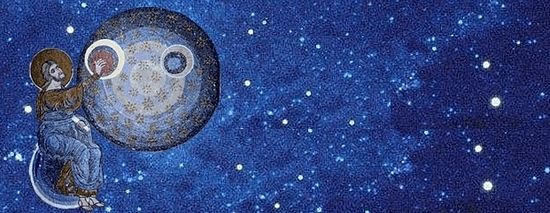
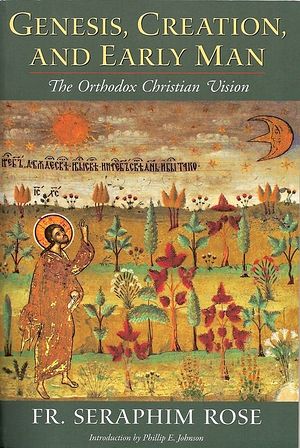
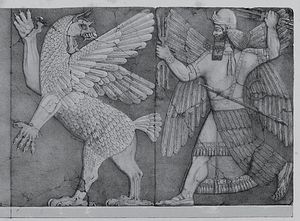
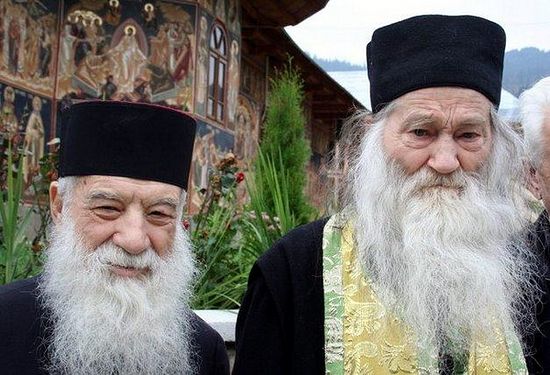
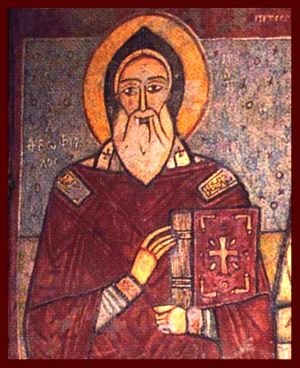
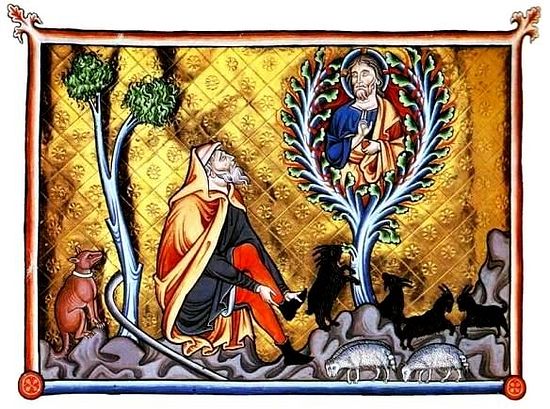
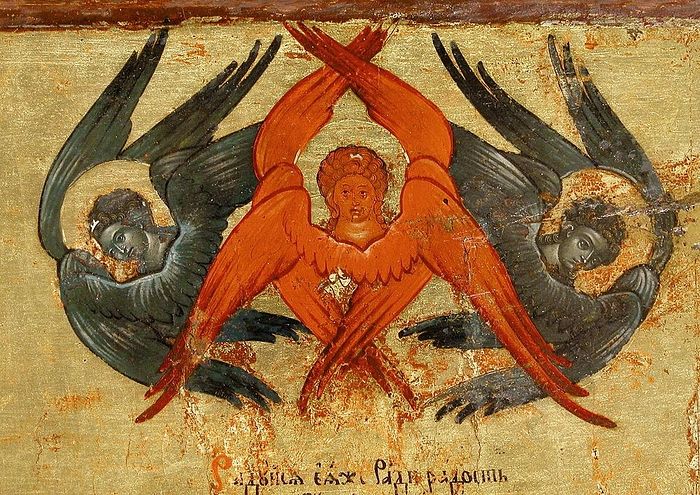
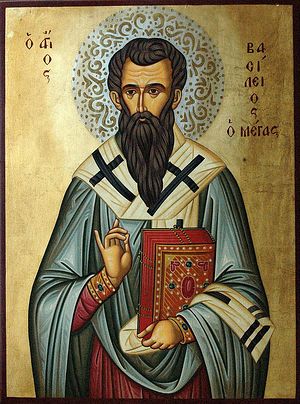
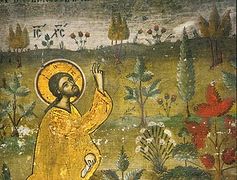
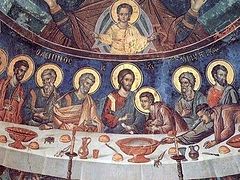
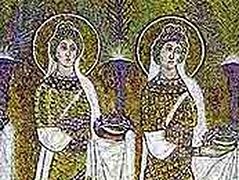
This is truly outstanding and all other writings to follow in this regards to Genesis. the best I have read.
In our Risen Lord,
Very Rev. Archimandrite Nektairos Serfes